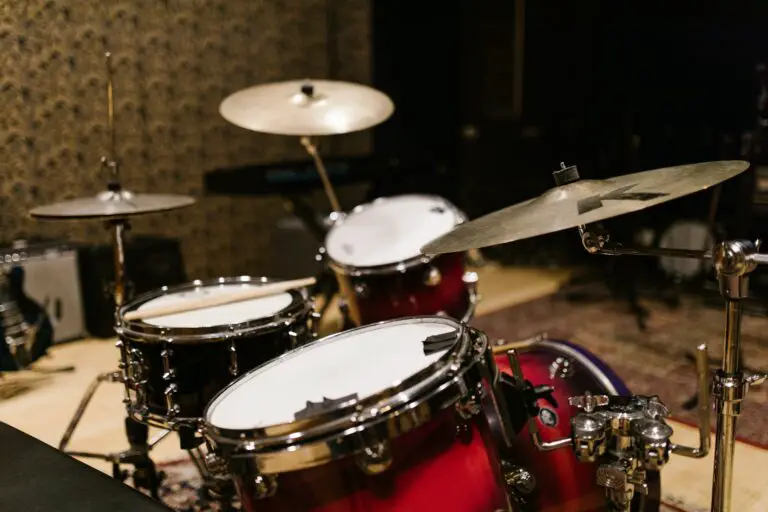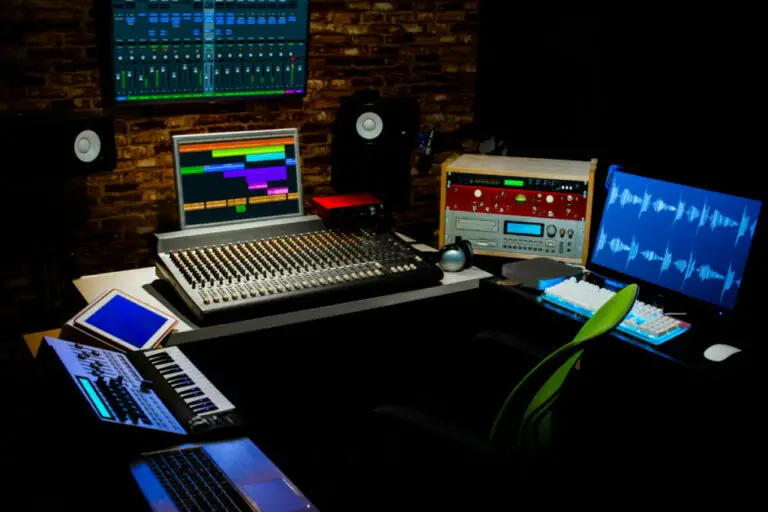20 Careers in Music for Music Lovers and Non-Musicians
If you’re a music lover but don’t desire to be on stage, do not fret. There are various excellent careers in music for non-musicians. So, what are the best careers in music for music lovers?
Some careers within the music industry for non-musicians include but are not limited to music journalists, representatives, lyricists, music publicists, music supervisors, and music lawyers.
The following article lists 16 careers in music for non-musicians. Read on, and who knows, maybe you’ll come across the career of your dreams.
1. Recording Engineer
Recording engineers have a crucial job regarding the success of a recorded piece of music. They take care of the technical aspects of the music recording process and ultimately determine the overall sound of a track.
You’ll need a technical understanding of recording equipment and a good ear to excel in this role. But you definitely won’t need to be a musician in its most traditional sense.
2. Music Journalist or Writer
For any musical connoisseur, the concept of music journalism is rather extraordinary. Music journalists do exactly what their name suggests. They write about music.
This could be anything from articles for popular magazines on the latest Kendrick Lamar album. You can also write on newsletters for niche websites on a recent indie track to the artist’s discography description on Spotify!
The music industry needs good writers.
3. AR Representative
“A” stands for artists, while “R” stands for repertoire. This career is exhilarating for many reasons. AR reps work for record labels and have the fascinating role of finding new artists. This involves diligent scanning of Spotify, Apple Music, YouTube, and SoundCloud to find the next best thing.
But the rep doesn’t just find an artist and send them off. They also care for the artist’s career as it progresses, ensuring that the artist develops as they wish.
As this is a coveted job, you may have to engage in some low-paid internships to work your way up. But people who put the work in can quickly propel themselves into some big money.
4. Lyricist
Lyricists, or songwriters, create amazing lyrics for artists. Seeing your work on the big stage is inspiring. Plus, another’s interpretation might inspire you further.
Many of the best lyricists wrote words before melodies or supplied words to artists who put a tune to them. Other lyricists work to build tunes themselves, giving artists a better idea of how it plays.
Working in lyric writing can be extremely rewarding and high-paying. They are modern-day poets, so let people see your art.
5. Music Supervisor
Music supervisors handle the music that backtracks a film, TV show, or video game. Sometimes they select this music, but more often, they are the supervisor who decides whether the musical selection fits.
Additionally, they will sort out the licensing side of things. You will need a keen emotional understanding and extensive musical knowledge to excel in this career.
Many supervisors also get a college degree, with Berklee having a degree in music supervision ready for those aspiring.
6. Music Publicist
Music publicists work on the business side of the music business. They engage with the media and other key players to ensure artists get the attention they need to enhance their careers.
This could include setting up sports event performances but also pulling stories from magazines that may not put their artist in the best light.
You must be good with people to do well as a music publicist. It also helps to have a keen eye for editing and quality work.
7. Music Director or Conductor
Every artist needs direction (whether they believe it or not!).
Music direction could be anything from the person conducting an orchestra to the individual casting the perfect Annie in a production.
Music directors often work in situations with many people to direct. These include musical theatre performances, live shows, or orchestral performances.
8. Instrument Dealer or Repairer
Every instrument needs to be purchased somewhere, and every instrument needs to be repaired.
To succeed in being an instrument dealer, repairer, or tuner, you will need a firm understanding of the mechanics of different instruments. Many people start out of their garage, eventually aspiring to become music store owners.
Dealers are necessary to connect artists with amazing instruments that help their performances. You could meet legends from Fender or Les Paul if you get good enough.
9. Music Talent Manager
Talent managers find musicians for labels and management agencies. They then handle the hiring process for those musicians.
This can include all sorts of responsibilities, including the following:
- Negotiating terms of the contracts
- Fees and royalties
- Intellectual property rules
- Publicity and promotional terms
- The image the artist should portray
- Which songs the artist should perform or record
Artist managers are those who “direct talent” towards the best path. Enough experience in the music industry will help you identify what helps artists excel.
10. Concert Security Guard
Looking for a great way to get into excellent concerts for free? Why not try out being a concert security guard?
This job can be stressful at times and easy at others. It depends on the types of concerts you are working at and the size of the venues.
To do this job successfully, you’ll need to be imposing. After all, you’ll end up being a human barrier with some shows.
11. Music Therapist
Music has been scientifically proven to improve mental health problems, learning disabilities, developmental disorders, and physical illnesses.
You can change people’s lives through music therapy while doing something you love. You will need a music education, or psychology degree, depending on the roles you are applying for.
12. Music Publisher
Ever wonder how much money Mariah Carey makes every year when “All I Want for Christmas is You” plays on repeat in December?
Music publishers handle that business. They manage the licensing matters for songs used in films and other media. They also monitor who uses the piece and ensure the royalties are paid when done so. Finally, they distribute those royalties to the artists, and in Mariah’s case, that’s a nice big check every year!
13. Music Lawyer
Guess what? Every musician and professional in the music industry needs legal representation. This includes writing up contracts for employment, song rights and royalties, publishing agreements, and the like.
You will need a legal degree to begin a career in this field, but it’s a great way for any non-musical music lover to be heavily involved in the industry.
14. Music Producers
Those in music production don’t need to have a strong stage presence. Instead, they are beloved for their technical skills in making music.
Producers work alongside front-end talent to create amazing tracks. Some work within record labels, while others are independent. You have complete control of where you end up.
Producers might also choose to run their own music studio. Those skilled in the industry can become prolific without ever getting on stage.
15. Music Teachers
People in music education set the foundation for new musicians. They typically have formal training and an understanding of music theory. However, some teachers have a deep understanding technique.
Music teachers can offer their skills to a group of students or one-on-one. Those who do so at a college need solid auditory skills and a higher education level to back themselves up.
Those who teach one-on-one can also leverage the internet to share their skills. In these cases, you don’t need a formal degree to teach.
16. Session Musicians
Talented artists who don’t want to be on stage prefer to work as session musicians. These musicians work within recording studios, contributing to other artists’ tracks.
The career path of session musicians is easier if you get practice through live performance. These musical experiences can help musicians build up their resumes, regardless of their future plans.
17. Lighting and Stage Design
Lighting designers are the folks responsible for making sure every spotlight and color change happens at just the right moment to match the music’s mood. It’s not just about illuminating the stage; it’s about creating a vibe and helping tell a story through light. Here’s what they do:
- Planning: Working out a lighting game plan that goes hand-in-hand with the music.
- Tech Know-How: Being savvy with all the different lighting equipment and technology.
- Teamwork: Collaborating with others to make sure everything comes together seamlessly on the day of the show.
Stage designers focus on setting up the stage with the right props, backgrounds, and layouts that vibe with the music. They’re the ones who think about what the artist’s music looks like in physical form. Their job involves:
- Creating Sets: Building cool sets that help tell a story or communicate a particular mood or message.
- Smart Space Use: Figuring out how to use the stage space in the best way.
- Innovation: Being open to using new technologies to make the stage even more exciting.
18. Music Photographers and Videographers
Music photographers are the people darting around at concerts and gigs, capturing the raw energy and emotion from behind their cameras. Their job involves:
- Being in the Moment: Quickly spotting and capturing those cool, unplanned moments that happen on stage.
- Knowing Their Gear: Being friends with their camera settings to work with the fast-paced and ever-changing lighting of live shows.
- Having an Eye for the Shot: Getting those shots that just feel like the music sounds.
Then there are the videographers, telling the story of the whole event, from the performances on stage to the excited faces in the crowd. They are all about:
- Getting the Right Shots: Moving around to catch all the action from the best angles.
- Smooth Editing: Piecing together clips to make a video that flows well and keeps people watching.
- Bringing the Viewer into the Story: Using video to share the buzz and excitement of the live event with viewers.
19. Administrative Support Roles
Administrative assistants and coordinators keep everything organized, handling a variety of tasks from managing schedules to ensuring that all necessary materials are prepared for meetings and events. They are involved in:
- Organization: Keeping track of numerous details to make sure nothing slips through the cracks.
- Coordination: Facilitating communication between different teams and individuals.
- Preparation: Ensuring all necessary groundwork is done for smooth operations.
20. Finance and Business Managers
Managing finances effectively is crucial in the music industry. Financial experts, including accountants and financial advisors, help manage budgets, ensure financial compliance, and offer advice on financial growth strategies. Their duties include:
- Budget Management: Overseeing budgets to ensure financial health.
- Compliance: Ensuring adherence to financial regulations and laws.
- Financial Planning: Helping artists and organizations plan for a sustainable financial future
Wrap Up
Whether you are a bold introvert who loves music or just someone who doesn’t like the stage, there are plenty of careers in the music industry. Many of these require no musical talent, but others can be bolstered through guitar-playing or singing abilities.
The point is this: anyone can be part of the music industry if they want it bad enough. So get out there, start talking to those already on the career track, and start building knowledge. Before long, you’ll become a valuable asset to your artists and music business colleagues.









